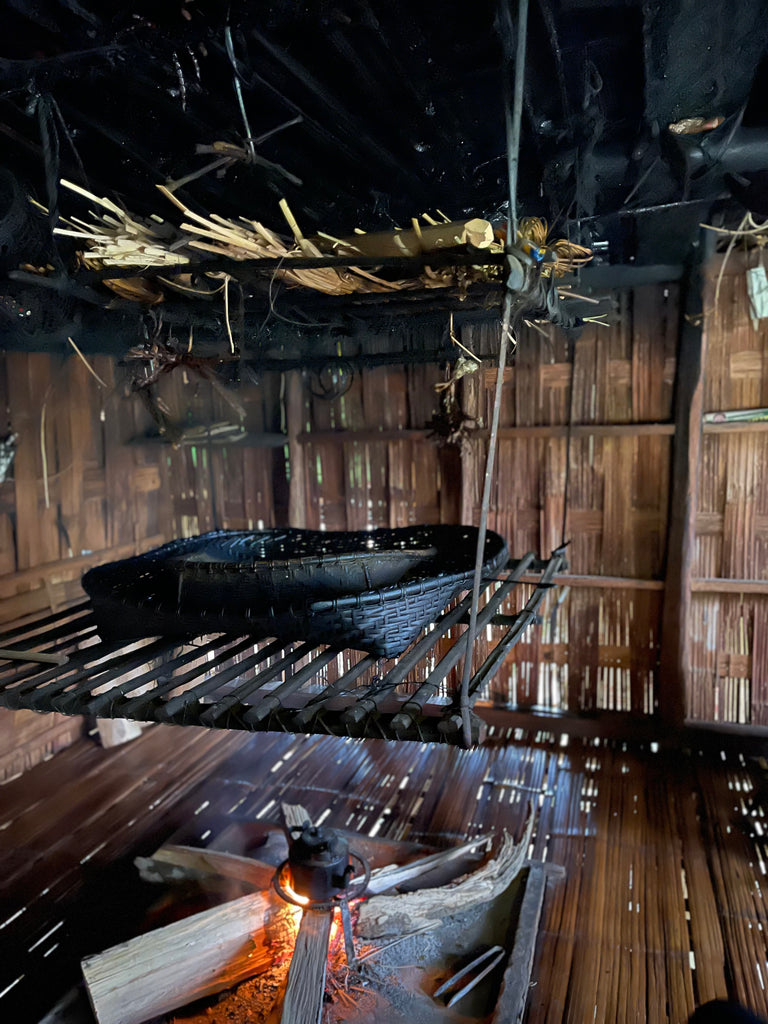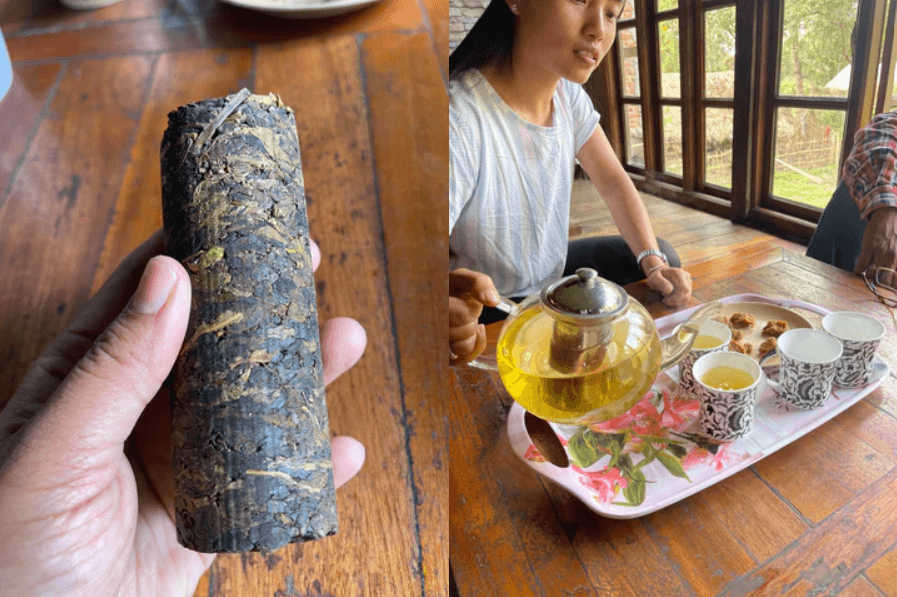No Products in the Cart

Nagaland

Seasonal plucking

2000-4000 ft

Wild assamica trees

Aged smoked green tea
The Naga tribes inhabit the wild forests of Nagaland and Arunachal Pradesh. Ancient wild tea trees of the assamica variety grow naturally in these forests. The Naga folk carefully climb these tea trees to pluck the choicest leaves. These leaves are then pan-fried and pounded into the hollow of a particular type of bamboo. The bamboo is sealed and placed in a makeshift swing over the fireplace. The smoke from the hearth will then naturally smoke the tea in the bamboo. Smoke and age lead to some oxidation of the tea; the older the bamboo tea, the more coveted it is.
This smoked, aged tea-filled bamboo is fondly called Khalap or Phalap by the locals, which in their native language means “what is this leaf”. The hearth of a Naga household is always burning, and you will usually find a boiling tea kettle over it.
This ancient practice of making khalap tea is a dying art. We are direct sourcing to avoid imitations, hopefully paying over fair trade prices will keep these khalap teas and the beautiful stories alive. This heritage Naga khalap tea is unique, difficult to find, and a limited edition.
Traditionally this tea is boiled by the Naga tribes in a kettle over a fire, but we prefer steeping it via gongfu style. On steeping, the tea is amber like honey with a mineral texture, good mouthfeel, and medium astringency. The aromas and flavors of a roaring campfire greet you with the first few sips. Intermingled with the smoky notes are earthy notes of manure, hay, camphor, and some hidden fruity sweetness.
Read more about the Traditional Indian Tea- Phalap & Khalap




Low-Moderate
To prepare an exquisite cup of tea use filtered water.

We recommend 4 gm of tea

100 ml water at a temperature of 195°F - 210°F (90°C - 99°C) at 85°C - 90°C (or 185°F - 195°F).

Origin
The Naga tribes live in the remote areas of Nagaland and Arunachal Pradesh in the land neighboring the Mayanmar border. They were the last headhunters of India before it was banned in the 1980s. Today the Naga tribes practice shifting cultivation, fishing, hunting and foraging non timber forest products.The largest and most well known tribe is the Konyak tribe of Longwa where the chieftain, who is also known as Angh, has a house that sits right in the middle of the India-Mayanmar border.




Like many teas, smoked bamboo tea may contain antioxidants and potential health-supportive properties, offering a satisfying and beneficial beverage choice.
I’m a fan of really smoky teas- so smoky that others find them off putting. This is not that tea. It’s deep, rich, earthy, and has a hint of smoke. Now I realize “hint of smoke” is relative, but I’ve brewed a bit from two different khalaps, and they were both subtly different, but neither was overwhelmingly smoky. What they shared in common: Deep full body, earthy green tea taste, no bitterness (even when I lengthened steep times). Both stood up to multiple infusions, and I tapped out before the tea ever weakened. I brewed about 5 cups western style, and the tea became richer and darker each time. In fact, the leaves did not completely unfurl until probably the third infusion. One small section of the whole khalap will last all day, and for me, well into the next.
Each one is a little different, and the second one had a bit of a charred edge which I found delicious. It’s one of the most unique teas I’ve had, and this is the only source I’ve found making it available. Get it while you can, and taste a bit of Naga culture.
Naga Khalap Tea (Smoked Aged Bamboo Wild Tea 2016)
Love the variety and good quality
I was interested in Naga Khalap tea because it seemed unique in so many ways, so I had to see what it was like. Brewed gongfu style, with several steeps (maybe 6?), and each cup was delicious. The strong smokiness is the dominant flavor (my wife, trying a sip, said it was like drinking a campfire – which is kind of accurate, but not in a bad way!), but it’s quite distinct from other smoked teas I’ve had, like lapsong souchong. The amount per order is relatively small, especially if you brew gongfu style as recommended, but I like it enough that I’m pretty sure I’ll be ordering more once I run out.
Yes, it can be steeped multiple times. We recommend using gongfu style of steeping tea.
It has mild caffeine levels. It is technically a smoked, aged green tea.
Traditionally it is as is and we enjoy it without milk and sugar. Having said that everyone's tea journey is so personal, you should prepare the tea the way you would enjoy most.
If you keep it in an airtight container it should stay fresh for years, just like a pu-Erh.

Herbs and Kettles ships online orders within 2-4 business days of receiving them. National holidays and carrier delays will impact the shipment.
A shipping confirmation will be sent to your email when your order ships. This email will include a tracking number.
At present, we do not ship internationally but are hoping to do so soon. If you are interested in any of our products for personal use or resale, please feel free to contact us at info@herbsandkettles.com
At Herbs and Kettles, we are dedicated to providing you with products of the highest quality.
We have a 30-day return policy, which means you have 30 days after receiving your item to request a return.
For returns, unopened items can be sent back at your expense within 30 days of delivery for a full refund.
Shipping fees are non-refundable.
It's essential that the boxes remain unopened, unused, and in good condition when they reach our receiving warehouse.
Before initiating a return, please contact us at info@herbsandkettles.com for instructions and the return address.
Items sent back to us without first requesting a return will not be accepted.
We do not accept returns on gift cards.
If you have concerns about the quality of a product or a damaged product, please reach out to us at info@herbsandkettles.com and we will be happy to assist you.
Damages and issues
Please inspect your order upon reception and contact us immediately if the item is defective, damaged or if you receive the wrong item, so that we can evaluate the issue and make it right.

